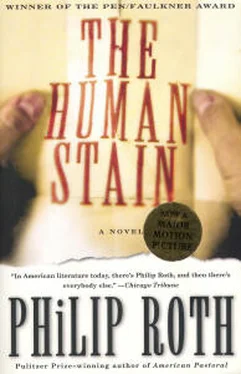Seeks. All right then, seeks. Do as the students say — Go for it! Youthful, petite, womanly, attractive, academically successful SWF French-born scholar, Parisian background, Yale Ph.D., Mass.-based, seeks...? And now just lay it on the line. Do not hide from the truth of what you are and do not hide from the truth of what you seek. A stunning, brilliant, hyperorgasmic woman seeks ... seeks ... seeks specifically and uncompromisingly what?
She wrote now in a rush.
Mature man with backbone. Unattached. Independent. Witty. Lively. Defiant. Forthright. Well educated. Satirical spirit. Charm. Knowledge and love of great books. Well spoken and straight-speaking. Trimly built. Five eight or nine. Mediterranean complexion. Green eyes preferred. Age unimportant. But must be intellectual. Graying hair acceptable, even desirable...
And then, and only then, did the mythical man being summoned forth in all earnestness on the screen condense into a portrait of someone she already knew. Abruptly she stopped writing. The exercise had been undertaken only as an experiment, to try loosening the grip of inhibition just a little before she renewed her effort to compose an ad not too diluted by circumspection. Nonetheless, she was astonished by what she'd come up with, by whom she'd come up with, in her distress wanting nothing more than to delete those forty-odd useless words as quickly as possible. And thinking, too, of the many reasons, including her shame, for her to accept defeat as a blessing and forgo hope of solving her in-the-middleness by participating in such an impossibly compromising scheme ... Thinking that if she had stayed in France she wouldn't need this ad, wouldn't need an ad for anything, least of all to find a man ... Thinking that coming to America was the bravest thing she had ever done, but that how brave she couldn't have known at the time. She just did it as the next step of her ambition, and not a crude ambition either, a dignified ambition, the ambition to be independent, but now she's left with the consequences. Ambition. Adventure. Glamour. The glamour of going to America. The superiority. The superiority of leaving. Left for the pleasure of one day coming home, having done it, of returning home triumphant. Left because I wanted to come home one day and have them say — what is it that I wanted them to say? “She did it. She did that. And if she did that, she can do anything. A girl who weighs a hundred and four pounds, barely five foot two, twenty years old, on her own, went there on her own with a name that didn't mean anything to anybody, and she did it. Self-made. Nobody knew her. Made herself.” And who was it that I wanted to have said it? And if they had, what difference would it make? “Our daughter in America...” I wanted them to say, to have to say, “She made it on her own in America.” Because I could not make a French success, a real success, not with my mother and her shadow over everything — the shadow of her accomplishments but, even worse, of her family, the shadow of the Walincourts, named for the place given to them in the thirteenth century by the king Saint Louis and conforming still to the family ideals as they were set in the thirteenth century. How Delphine hated all those families, the pure and ancient aristocracy of the provinces, all of them thinking the same, looking the same, sharing the same stifling values and the same stifling religious obedience. However much ambition they have, however much they push their children, they bring their children up to the same litany of charity, selflessness, discipline, faith, and respect — respect not for the individual ( down with the individual!) but for the traditions of the family. Superior to intelligence, to creativity, to a deep development of oneself apart from them, superior to everything, were the traditions of the stupid Walincourts! It was Delphine's mother who embodied those values, who imposed them on the household, who would have enchained her only daughter to those values from birth to the grave had her daughter been without the strength, from adolescence on, to run from her as far as she could. The Walincourt children of Delphine's generation either fell into absolute conformity or rebelled so gruesomely they were incomprehensible, and Delphine's success was to have done neither. From a background few ever even begin to recover from, Delphine had managed a unique escape. By coming to America, to Yale, to Athena, she had, in fact, surpassed her mother, who couldn't herself have dreamed of leaving France — without Delphine's father and his money, Catherine de Walincourt could hardly dream, at twenty-two, of leaving Picardy for Paris. Because if she left Picardy and the fortress of her family, who would she be? What would her name mean? I left because I wanted to have an accomplishment that nobody could mistake, that had nothing to do with them, that was my own ... Thinking that the reason she can't get an American man isn't that she can't get an American man, it's that she can't understand these men and that she will never understand these men, and the reason she can't understand these men is because she is not fluent. With all her pride in her fluency, with all her fluency, she is not fluent! I think I understand them, and I do understand; what I don't understand isn't what they say, it's everything they don't say, everything they're not saying. Here she operates at fifty percent of her intelligence, and in Paris she understood every nuance. What's the point of being smart here when, because I am not from here, I am de facto dumb ... Thinking that the only English she really understands — no, the only American she understands — is academic American, which is hardly American, which is why she can't make it in, will never make it in, which is why there'll never be a man, why this will never be her home, why her intuitions are wrong and always will be, why the cozy intellectual life she had in Paris as a student will never be hers again, why for the rest of her life she is going to understand eleven percent of this country and zero percent of these men ... Thinking that all her intellectual advantages have been muted by her being dépaysée... Thinking that she has lost her peripheral vision, that she sees things that are in front of her but nothing out of the corner of her eye, that what she has here is not the vision of a woman of her intelligence but a flat, a totally frontal vision, the vision of an immigrant or a displaced person, a misplaced person ... Thinking, Why did I leave? Because of my mother's shadow? This is why I gave up everything that was mine, everything that was familiar, everything that had made me a subtle being and not this mess of uncertainty that I've become. Everything that I loved I gave up. People do that when their countries are impossible to live in because the fascists have taken change but not because of their mother's shadow ... Thinking, Why did I leave, what have I done, this is impossible. My friends, our talk, my city, the men, all the intelligent men. Confident men I could converse with. Mature men who could understand. Stable, passionate, masculine men. Strong, unintimidated men. Men legitimately and unambiguously men ... Thinking, Why didn't somebody stop me, why didn't somebody say something to me? Away from home for less than ten years and it feels like two lifetimes already ... Thinking that she's Catherine de Walincourt Roux's little daughter still, that she has not changed that by one iota ... Thinking that being French in Athena may have made her exotic to the natives, but it hasn't made her anything more extraordinary to her mother and it never will ... Thinking, yes, that's why she left, to elude her mother's fixedforever overshadowing shadow, and that's what blocks her return, and now she's exactly nowhere, in the middle, neither there nor here ... Thinking that under her exotic Frenchness she is to herself who she always was, that all the exotic Frenchness has achieved in America is to make of her the consummate miserable, misunderstood foreigner ... Thinking that she's worse even than in the middle — that she's in exile, in, of all things, a stupid-making, self-imposed anguishing exile from her mother — Delphine neglects to observe that earlier, at the outset, instead of addressing the ad to the New York Review of Books, she had automatically addressed it to the recipients of her previous communication, the recipients of most of her communications — to the ten staff members of the Athena Department of Languages and Literature. She neglects first to observe that mistake and then, in her distracted, turbulent, emotionally taxing state, neglects also to observe that instead of hitting the delete button, she is adding one common-enough tiny error to another common-enough tiny error by hitting the send button instead. And so off, irretrievably off goes the ad in quest of a Coleman Silk duplicate or facsimile, and not to the classified section of the New York Review of Books but to every member of her department.
Читать дальше












